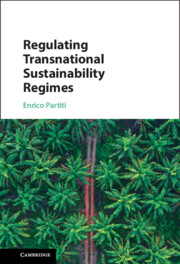Book contents
- Regulating Transnational Sustainability Regimes
- Regulating Transnational Sustainability Regimes
- Copyright page
- Contents
- Acknowledgements
- Abbreviations
- Introduction
- 1 Features, Typologies and Effects of Voluntary Sustainability Standards
- 2 Public Authority and Voluntary Sustainability Standards
- 3 Voluntary Sustainability Standards Under EU Competition Law
- 4 Voluntary Sustainability Standards and EU Market Regulation
- 5 Attribution and Expected Conduct of WTO Members Towards Voluntary Sustainability Standards
- 6 Transposing Technical Barriers to Trade Agreement Meta-rules to Voluntary Sustainability Standards
- Conclusion
- Bibliography
- Index
2 - Public Authority and Voluntary Sustainability Standards
Published online by Cambridge University Press: 12 May 2022
- Regulating Transnational Sustainability Regimes
- Regulating Transnational Sustainability Regimes
- Copyright page
- Contents
- Acknowledgements
- Abbreviations
- Introduction
- 1 Features, Typologies and Effects of Voluntary Sustainability Standards
- 2 Public Authority and Voluntary Sustainability Standards
- 3 Voluntary Sustainability Standards Under EU Competition Law
- 4 Voluntary Sustainability Standards and EU Market Regulation
- 5 Attribution and Expected Conduct of WTO Members Towards Voluntary Sustainability Standards
- 6 Transposing Technical Barriers to Trade Agreement Meta-rules to Voluntary Sustainability Standards
- Conclusion
- Bibliography
- Index
Summary
Chapter 2 studies VSS in relation to public authority and their possible complementarity with public rules at the international and EU/national level. The interactions between VSS and public authority are illustrated with reference to EU practice. These regulatory forms, labelled as public use and facilitation of VSS, result in collaborative rule-making and coordination of regulatory effects between public and private regimes. As an outcome of these interplays, public and private regimes are mutually influenced in a process of hybridisation. The chapter illustrates the limits to complementarity that emerge from assessing VSS under WTO rules, in particular when it is taken into account that VSS emerged as a response to the perceived WTO constraints on public action. The chapter then sets the coordinates of a role for public authority towards VSS. Literature on global public goods, transnational law and global governance clarifies normatively the level of public intervention vis-à-vis VSS. The chapter also illustrates how provisions of EU competition law, free movement and WTO law can discipline VSS, and highlights the main outstanding legal issues that will be addressed.
Keywords
- Type
- Chapter
- Information
- Regulating Transnational Sustainability Regimes , pp. 58 - 100Publisher: Cambridge University PressPrint publication year: 2022

